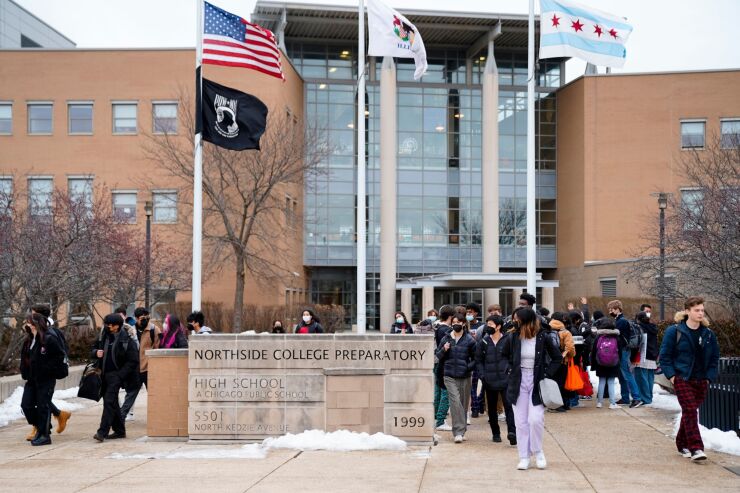The Chicago Board of Education plans to bring its general obligation bond credit to the market this week for the first time since the Federal Reserve began pushing up interest rates.
The $600 million of GO bonds are secured by the full faith and credit and taxing power of the Chicago Board of Education, but designed to be repaid with dedicated state aid revenue.
They enter the market with two speculative grade ratings and one investment grade after affirmations across the board.

Kroll Bond Rating Agency stands alone with an investment grade rating, giving the new deal a BBB, and affirming outstanding BBB and BBB-plus ratings on CPS general obligation bonds, with the extra notch going to debt benefiting from a special revenue bond legal opinion.
"The assigned long-term rating and stable outlook recognizes CPS's satisfactory financial position, underscored by a trend of enhanced state aid support, the enactment of dedicated sources for pension funding, and most recently, ample federal stimulus funding supporting balanced operating performance," Kroll wrote in the rating report released Monday.
Fitch Ratings on Monday assigned its BB-plus rating to the deal and affirmed the district's issuer default rating and outstanding unlimited tax general obligation bonds at BB-plus, one notch beneath investment grade. The outlook is stable.
Credit risks center on the district's "elevated long-term liability burden, driven by a rising net pension liability, and limited budgetary tools to address future cyclical downturns," the agency said in its report. "An often-contentious relationship with the Chicago Teachers Union places additional strain on the district's expense management and flexibility."
S&P Global Ratings Friday affirmed its BB-plus rating and stable outlook ahead of the deal.
"The rating reflects our view of the board's deep and diverse local economy that continues to grow, Illinois' own stabilized fiscal position, and strengthened reserves, supported by continued surpluses, that we view as strong and that management expects to remain stable or improve over the next couple of years," S&P analyst Ying Huang said in a news release. "Nevertheless, the rating continues to reflect our view of the board's significant short- and long-term challenges, including negative cash flow, notably increased operational spending despite enrollment declines, a historically contentious relationship with the Chicago Teachers' Union, and a sizable debt and pension liability."
S&P said it is unlikely to raise the district to investment grade during the outlook period given a still-weak liquidity position.
"However, we could consider a positive rating action over time if the board sustains a structurally balanced budget, achieves and maintains a healthy fund balance position in compliance with its policy target, and exhibits continued liquidity improvements, with a reduced amount of tax anticipation notes outstanding and negative cash flow across fewer months, in a post-federal stimulus environment," the S&P rating report said. "We would also view successful navigation of the potential Chicago Teachers' Union contract renewal in 2024 and the transition of board governance structure without material impacts on the district's operations favorably."
That transition, mandated
Starting in 2025, part of the board will be elected directly, evolving into a fully elected 21-member board by January 2027.
The "elected school board changes CPS governance, not security for bondholders," the district writes in an online "roadshow" investor presentation.
The current seven-member board was appointed by Mayor Brandon Johnson, a former CPS teacher and labor union organizer, after he took office in May.
S&P raised a cautionary note that any upward rating potential is also predicated on the state government at least fully funding its "Evidence-Based Funding" formula and not making substantial cuts, "although we view cuts as currently unlikely."
The 2017 shift to an evidence-based funding formula represented
District officials in the investor presentation say that state aid model helped it achieve structural balance, with a $276 million operating surplus in fiscal 2022, with $7.66 billion of operating revenue and $7.396 million of expenditures and a general fund balance that grew from $324 million in fiscal 2018 to more than $1 billion in fiscal 2022.
As Kroll noted in its rating report, that position benefited from $623 million of federal stimulus grant funding during fiscal 2022.
The district is using $670 million
The district's last bond sale, in March, tapped
The last time CPS was in the market with its general obligation bonds, it sold $872 million in January 2022.
That deal, priced before
On Monday, for example, a customer sold a $5 million piece of a 2034 CPS GO bond maturity at 97.64 cents to yield 5.28%, according to a trade reported on the Municipal Securities Rulemaking Board's EMMA website.
The market
This week's bonds are preliminarily expected to be structured with a 2031 to 2049 amortization, with a 10-year par call, according to the investor presentation.
The pricing is preliminarily scheduled "on or about" Thursday, according to the investor presentation that was updated Monday.
BofA Securities is senior bookrunner for a 13-member syndicate.
Columbia Capital Management is municipal advisor. Katten Muchin Rosenman LLP is bond counsel.
In September, the district reported that its 20th day of school enrollment data showed a slight, 0.4%, increase in the student population to 323,291 students, representing the first increase in the district's enrollment in 12 years.
"It's important to note that there are many reasons that we were able to maintain and even slightly improve our enrollment this year, including the fact that fewer students left our system," CPS CEO Pedro Martinez





